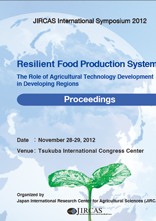Opening Remarks

Good afternoon. On behalf of the symposium organizers I have the honor and the privilege to open the JIRCAS
International Symposium 2012, Resilient Food Production Systems: The Role of Agricultural Technology
Development in Developing Regions. It is organized by JIRCAS, with the support of the Research Council
Secretariat of the Ministry of Agriculture, Forestry and Fisheries (MAFF), National Agriculture and Food
Research Organization (NARO), Japan International Cooperation Agency (JICA), Japan Forum on International
Agriculture Research for Sustainable Development, International Food Policy Research Institute (IFPRI), as well
as the Food and Agriculture Organization of the United Nations, Liaison Office in Japan (FAOLOJA).
First of all, I would like to extend my cordial welcome to all the guests and participants, particularly those who
came to Japan from overseas. I would also like to express my sincere thanks to the prominent keynote speakers,
namely Dr. Shenggen Fan, of the International Food Policy Research, and Prof. Chieko Umetsu of Nagasaki
University for their kind acceptance to deliver very relevant lectures during this symposium. I would also like to
extend my appreciation to the other speakers, chairs and panel discussants in the sessions to follow today and
tomorrow.
After the Great East Japan Earthquake, building communities resilient to disasters became the focus of rural
development in Japan. Protective measures were applied by the agriculture sector to mitigate the effects of future
disasters. Farmlands and facilities across the country were strengthened, not only in terms of infrastructure but
also in terms of relevant policy changes. Compared to Japan, the condition of the agricultural environment in
developing regions is much more fragile, due to a variety of risks that make food production unstable.
Global environmental problems attributable to climate change such as extreme weather have recently emerged,
with developing regions being the most vulnerable.
In African regions, specifically the Horn of Africa and the Sahara, people suffer from hunger and poverty due to
drought, desertification and crop damage from plant diseases and insect infestations. Internal factors such as
political instability, lack of market options and underdeveloped infrastructure aggravate the situation,
unfortunately. These have become some of the highest-priority global issues facing humanity. For example, in
the Horn of Africa, severe drought occurred from the middle of 2010 until the early part of this year. That is one
example of how serious damage occurred in Africa. That drought was considered the worst in the last 60 years.
It caused serious food shortages and triggered one of the worst famines in recent history. Assistance from all over
the world was poured in to alleviate the problem. However, this solution was only temporary. Food security as
well as social stability must be recognized and addressed as key regional issues for the affected areas to recover. 8
This 19th JIRCAS International Symposium highlights diversified approaches for the establishment of resilient
food production systems. These approaches include crop breeding, cultivation technology, water and soil
management technology, monitoring technology and forecast systems for pests and extreme weather events, as
well as socio-economic measures such as index insurance. Traditional knowledge and technologies, which have
been locally developed to cope with such risks, are also important, and will be reassessed during this symposium.
Furthermore, there will be a discussion of policies allowing the dissemination of developed technologies for
actual practice on agricultural fields.
The keyword of this symposium is “resilience.” It generally means resistance to risks. This includes adaptability
to risks and perhaps more importantly the ability to recover from damaged conditions after a disaster. The
symposium will not tackle risks that happen every several hundred years, such as the recent major earthquake.
Rather, it will discuss those that reoccur within a few to several years. A total of 12 speakers will present papers
focusing on resilience to extreme weather events resulting in drought, flood and so on, affecting the livestock
sector and the production of upland crops and paddy rice. This will be capped by a session on risk recognition
and monitoring systems. A panel discussion entitled “Role of Technological Development and Japan’s
Contribution” will be conducted tomorrow afternoon by noted specialists in soil, weather, agricultural economy
and biodiversity studies.
Ladies and gentlemen, JIRCAS, as a center of agricultural research for development in Japan, tries to play a
pivotal role in agricultural technology improvement in the developing regions. In order to achieve our mission,
we are trying to keep our research programs relevant to the urgent and important global issues, which are changing
continuously.
The 5th Tokyo International Conference on African Development (TICAD V) to be held in Yokohama in June
next year will lend further support to the initiative. This JIRCAS symposium has been authorized as one of the
TICAD V partner projects. It is sincerely hoped that results of the discussions will contribute greatly to agricultural
development in Africa.
Finally, I would like to extend my sincere hope that this symposium will make significant results with your
precious and active participation. Thank you very much.
| Date of issued | |
|---|---|
| Creator | Masa Iwanaga |
| Publisher | Japan International Research Center for Agricultural Sciences |
| Available Online | |
| Issue | 2012 |
| spage | 7 |
| epage | 8 |
| Rights | Japan International Research Center for Agricultural Sciences |
| Language | eng |
